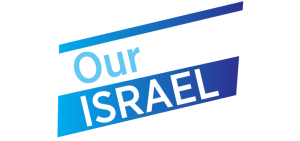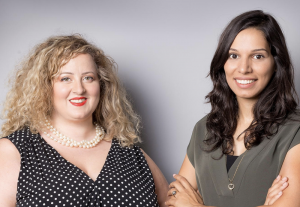- About Us
- Policy Center
- Learn
- Press Room
- Blog
- Get Involved
- Donate
- Donate to J Street Online
- Make a Gift in Someone’s Honor or Memory
- Make a Monthly Gift
- Tax-Deductible Donations
- Giving by mail

J Street’s “Our Israel” project spotlights the amazing Israeli groups who share our progressive vision for Israel, and who are helping build a society underpinned by the founding values of democracy, self-determination and equality which are enshrined in Israel’s Declaration of Independence.

During the height of the coronavirus pandemic, the Israeli Ministry of Defense partnered with a relatively small Israeli-Arab start-up with an unconventional idea: Could COVID symptoms be screened simply by an app analyzing a recording of your voice?
“You can screen everyone with a software-only solution at home at their own convenience. That’s why we think it’s great,” Dr. Shady Hassan told DocWire News in April. The CEO of the health tech start-up Healthymize, Dr. Hassan has for years been working on cutting-edge AI technology that helps screen for major diseases like lung disease, Emphysema and chronic bronchitis by analyzing a patient’s voice. All you have to do to get a screening is download an app, hit the record button, count from 50 to 70 out loud, and get your result. A clinical trial in India of the screener found that it was more than 80% accurate.
Healthymize is just one of the many promising start-ups that have been cultivated by PresenTense, an Israeli impact organization that looks to make entrepreneurship accessible to underprivileged communities in Israel. Led by Ariella Rosen and Khouloud Ayuti, the group has launched a number of business incubators across the country focused on providing the necessary resources for entrepreneurs from the Arab Israeli, Bedouin, and Haredi communities, among others, to start businesses.
“Israel is known as the ‘Start-Up Nation’ due to its innovative and advanced tech industries,” says Ayuti, “but only a small part of the population has actually benefited from this technological revolution.” Indeed, of the 347,000 employees in Israel’s high-tech industry, nearly two-thirds are men, only about two percent are Arabs, and less than one percent are from the Haredi community.
As a result, despite the fact that tech makes up 45% of Israel’s exports, the gains from that success have been unequally distributed. While the unemployment rate in the country has dropped considerably since the height of the coronavirus pandemic, it still remains high, with the remaining Israelis out of work disproportionately belonging to the Arab community. Arab Israelis have an average income of less than 60% of what their fellow Jewish citizens make, with a sizable wealth gap between the two groups.
According to Rosen, a major reason for this is disparities in the level of education investment. “It is evident that there are more funds spent on education in areas of high socioeconomic standing; twice or three times the amount is spent in comparison to the periphery, Arab and Jewish Orthodox communities,” she says. This may contribute to a larger problem–The Arab community just isn’t targeted for recruitment in the start-up space. One survey found that while almost all Jewish Israelis knew about the growing job opportunities in the tech sector, a majority of Arabs did not.
With PresenTense, Ayuti and Rosen are trying to change that.
“Our goal is to promote diversity, equity and inclusion alongside sustainable economic growth by exposing youth and young adults from underrepresented communities to innovative entrepreneurial practices,” says Ayuti. “This exposure provides participants from underrepresented communities with an opportunity to maximize their potential, serve as inspirational role models in their communities and launch businesses and tech startups that will in turn create hundreds of new jobs.”
Over the past decade, PresenTense has had more than 20,000 participants from underrepresented communities across Israel take part in over 120 of their entrepreneurship programs, including 3,500 high-school students. The result has been more than 850 different businesses launched, 60% of which are active and sustainable to date.
Ayuti and Rosen attribute their success in part to the establishment of communal ties. In order to recruit such a large number of program participants from underserved Israeli communities, PresenTense has worked hard to foster relationships with the communities in which it works. When they commit to a particular geographic area, the organization will stay there for at least five years and hire program coordinators and managers who are not just from that community, but from PresenTense’s target audience within that community. “This enables us to build trust with the local community and tailor our programs to its needs,” said Rosen.
Success in recruiting program participants is only a small part of their work. Once new potential entrepreneurs are in the program, PresenTense is committed to giving them the resources they need to succeed. In their opinion, the biggest resource that they can provide burgeoning business owners is mentorship from more experienced hands.

“Mentorship enables emerging entrepreneurs from underrepresented communities to receive guidance and valuable feedback from experienced professionals more familiar with Israel’s ‘start-up nation’ ecosystem,” Ayuti says. She also pointed out that mentors not only give their less experienced counterparts a model for success but also provide them with networking and collaboration opportunities that would not be possible otherwise.
Rosen and Ayuti and extremely proud of the businesses which have sprung up from the ranks of their incubator participants. In addition to Healthymize, the health tech company leading the charge on sound-based disease testing, PresenTense has sponsored an audio personalization start-up, a coding academy for asylum seekers, and even another incubator, among many other successful ventures.
Ayuti and Rosen are optimistic not just about what the development of these businesses means for the communities they are empowering, but for all of Israel. “Investing in underrepresented communities opens Israel’s economy to previously untapped talents and resources,” says Rosen. “It could change a lot about how we do business, and inevitably progress our country for the better.”
Ultimately, PresenTense is working towards an Israel that is not only more innovative but shares the success from that innovation more equally.
“If Israel is to truly be the world’s ‘Startup Nation,’” says Ayuti, “then it must be an inclusive society in which all groups can get a foothold in our entrepreneurial ecosystem.”